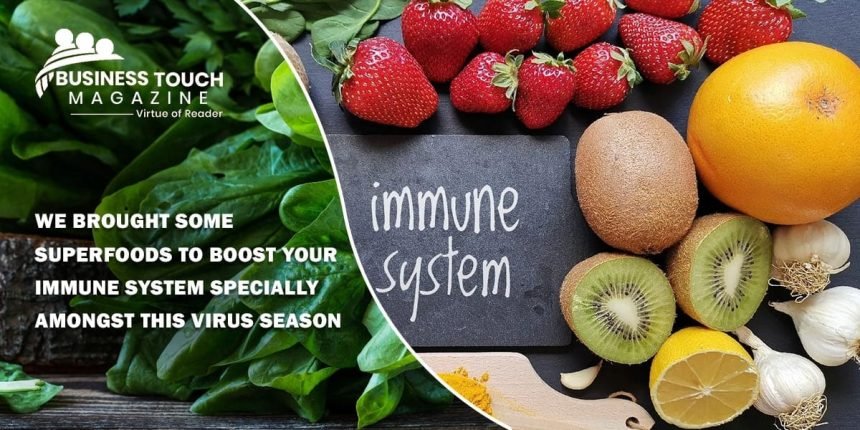Keeping your immune system robust may be made more accessible by consuming specific foods, specifically when the world is going through a lot of viruses and infections.
Visit your local food shop if you are seeking for preventative measures against the flu and other illnesses. Make a list of these 12 potent immune system boosters superfoodsto include in your daily diet.
You must remember that no substance can cure or prevent any ailment.
This year’s coronavirus COVID-19 pandemic highlights the need to understand that no supplement, diet or other lifestyle alteration will protect you against COVID-19 other than physical separation, social distancing, and reasonable hygiene measures.
1. Citrus fruits
After catching a cold, most individuals first go for vitamin C. As a result, it helps to strengthen your body’s defense mechanisms.
Infection-fighting white blood cells are considered to be increased by vitamin C.
Vitamin C is found in almost all citrus fruits. This vitamin may be added to every meal since there are so many options to pick from.
Citrus fruits that are popular include:
• Grapefruit
• Oranges
• Clementines
• Tangerines
• Lemons
• Limes
In order to maintain your health, you must consume vitamin C on a regular basis since your body cannot make or retain it. For the majority of individuals, the daily recommended dosage is:
• 75mg for women
• For males, the recommended dosage is 90 milligrams.
Avoid consuming more than 2,000 milligrams (mg) of supplements each day if you decide to go that route.
Vitamin C may speed up your recovery from a cold, but there’s no proof that it works against the SARS-CoV-2 coronavirus, which is brand new.
2. Red Bell Peppers
It’s a myth that citrus fruits have the highest concentration of vitamin C of any fruit or vegetable. In terms of vitamin C content, red bell peppers are about three times as potent as a Florida orange (127 mg) (45 mg). Beta carotene is abundant in them as well.
Vitamin C, in addition to strengthening your immune system, may help you keep your skin healthy. Vitamin A is made from beta carotene, which your body transforms to a beneficial nutrient for your eyes and skin.
3. Broccoli
Vitamins and minerals abound in broccoli. Broccoli is one of the healthiest veggies you can eat. It is packed with vitamins A, C, and E, as well as fibre and several other antioxidants.
As a rule of thumb, cook it as little as possible, or better yet, don’t cook it at all. According to studies, steaming is the greatest method for preserving food’s nutritional value.
4. Onion
Almost every cuisine in the world uses garlic in some form or another. It enhances the flavour of food and is essential to good health.
When it comes to combating disease, it was used by cultures far before modern times. Additionally, there is some evidence that garlic may help decrease blood pressure by slowing arterial hardening.
Compounds such as allicin seem to be responsible for garlic’s immune-boosting benefits.
5. Ginger
After being ill, many people resort to ginger. Inflammation may cause a sore throat, but ginger may be able to relieve it. Ginger may also help alleviate nausea.
Ginger, a close sibling of capsaicin, is utilized in many delicious delicacies, but it also delivers a punch when it comes to heat.
Chronic discomfort may be lessened by ginger, and it may even help reduce cholesterol.
6. Spinach
In addition to vitamin C, spinach contains several antioxidants and beta carotene, both of which may enhance our immune systems’ capacity to fight illness.
Spinach, like broccoli, is best when cooked as little as possible so that it preserves its nutritional value. Light cooking, on the other hand, facilitates vitamin A absorption and releases other nutrients from antinutrient oxalic acid. Some spinach recipes are available on this page.
7. Yoghurt
Greek yoghurt, for example, should include “live and active cultures” on the label. These cultures may boost your body’s ability to fight against sickness by stimulating your immune system.
Get plain yoghurts instead than ones that have been flavoured and sugar-laden. Instead of using sugar, you may sweeten plain yoghurt with fruit and honey.
Vitamin D may also be found in yoghurt, so look for types that are fortified with it. Our body’s natural defences against illness are considered to be bolstered by vitamin D, which aids in immune system regulation.
8. Almonds
Vitamin E is often overshadowed by vitamin C in the battle against the common cold. However, a healthy immune system relies on this strong antioxidant.
If you do not have enough fat in your diet, your body won’t absorb it. As well as being a good source of vitamin E, nuts, such as almonds, also contain healthful fats.
There is no need for adults to consume more than 15 mg of vitamin E each day. Almonds in a half-cup portion, which is equivalent to 46 whole, shelled almonds, offer 100 percent of the daily recommended intake.
9. Sunflower Seeds
Vitamins B-6 and E, as well as phosphorus and magnesium, may be found in sunflower seeds.
Vitamin E has a crucial role in regulating and sustaining the immune system’s overall function. Avocados and dark leafy greens are also good sources of vitamin E because of the high levels found in these foods.
In addition, sunflower seeds are a great source of selenium. Selenium in a single ounce is roughly half what an adult requires daily. Swine flu and other viral diseases have been the subject of a number of investigations on animals (H1N1).
10. Turmeric
Turmeric is a common curry spice that many people are familiar with. Osteoarthritis and rheumatoid arthritis are two conditions for which turmeric has been used as an anti-inflammatory for decades.
Curcumin, the pigment in turmeric that gives it its unique yellow colour, has been shown in studies to reduce the muscle damage caused by exercise. In animal research, curcumin has shown promise as an immune booster and an antiviral. More investigation is required.
11. Papaya
Kiwis, like papayas, provide an abundance of critical elements, such as vitamin C, potassium and folate.
Kiwi’s other nutrients maintain your body is working correctly while vitamin C increases white blood cells to combat illness.
Preventing infections in new and inventive ways
Proper nutrition requires a wide variety of foods. Even if you consume one of these meals on a regular basis, it will not be enough to help you fight off the flu or other diseases. To avoid getting too much of one vitamin and too little of another, pay attention to serving sizes and the recommended daily dosage.
You and your family may avoid the flu, cold, and other diseases by following a healthy diet and taking other preventative measures.




